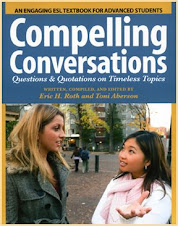Tuesday, December 23, 2008
Consumer Product Reviews: Get Your ESL Students Talking About their Consumer Choices
Do you let your students write and deliver product reviews? Consumer reviews help ESL students develop research skills, use critical thinking, and share their consumer choices.
The giving and receiving of gifts has become a central feature of Christmas, Hanukkah, winter solstice and New Year celebrations. We live – for worse or for better – in a consumer age. English language learners, around the world, share in this winter shopping spree. Product reviews allow them to talk about their gift selections and holiday gifts.
Many ESL students, especially young, hip, and wealthy teenagers and college students have also bought into - literally - the odd belief that "you are what you have". Therefore, these English language learners and experienced consumers often love to share their "insights" about consumer products. Product reviews speak to their lifestyles, passions, and curiosity.
As an ESL teacher, I use consumer product reviews to teach the difference between fact and opinion and identify critical thinking skills. The assignment lends itself to reviewing a few key concepts like “details matter” and “numbers add precision” while introducing hedging language. Of course, engaging student interests also leads to better classroom discussions and more use of authentic language.
You can also design a very simple presentation form so everyone can provide peer feedback. Result? The students receive written feedback on their product reviews from you (the teacher) and their classmates. Again, teenagers being teenagers, they love to read about themselves and the feedback. If possible, I also suggest videotaping the student reviews and posting them on a class website for both self and peer reviews.
Teaching high school students possess many challenges, beginning with capturing and holding their interest. Personally, I have found teaching slightly older undergraduate students far more satisfying - and far easier. But I have also had considerable success in short term IEP summer programs with that tough audience. Product reviews have always been a hit!
Here is both my short assignment sheet and a product review worksheet for ESL students.
----------------------------------------------------------------------------------------------------------
YOUR TURN: GIVING A PRODUCT REVIEW
You have probably bought thousands of items as a consumer. You have looked at and considered thousands more. You can’t buy everything; you have to pick and choose the products that fit you and your lifestyle.
Choose a single product and prepare to give a brief product review.
Your product review should include:
• a description of the product
• the way the product is used
• the cost of the product
• a comparison with other, similar products
• a recommendation to buy or not buy the product
• a reason for your recommendation
• a rating on a scale of 1-5
-----------------------------------------------------------------------------------------
PRODUCT REVIEW WORKSHEET
PRODUCT:
PURPOSE:
AUDIENCE:
USE:
COST:
COMPETITORS:
RECOMMENDATION:
REASON:
RATING:
_____________________________________________________________
As an old American cereal commercial used to say, “try it – you’ll like it!”
Ask more. Know more. Share more.
Create Compelling Conversations.
Visit www.CompellingConversations.com
Saturday, July 26, 2008
Make Change Your Friend: Lesson for ESL class
Class bookends, both beginnings and endings, deserve special attention. This teaching proverb becomes more important in short term summer English programs where ESL students have traveled thousands of miles to study English.
As so often, I tend to learn by stumbling. Yet, over the years, I’ve developed a rather effective last class ESL lecture around a simple theme: Make Change Your Friend.
Working in an Intensive English Program (IEP) during the summer provides many satisfactions., but sometimes it feels like the course ends just when you have finally begun to really know your students. The students, often college age and less focused on grades than regular university students, come to study English, but also to enjoy themselves in Southern California. The classes tend to more relaxed, looser, and casual than my usual teaching situations, but more goal-focused and academic than adult education classes filled with working immigrants. The students, often unused to choosing their own readings and talking with an interested instructor, appreciate the personal feedback. Many students are also on their first trip to California and the United States, and have had rather disappointing experiences with rigid educational institutions back in their native countries.Therefore, many students enter their last class feeling rather down. Vacation is almost over. Few exude excitement about returning home. How do you change that atmosphere to emphasize the positive and provide an exceptional last ESL class?
What are you looking forward to? That's the question I ask on the attendance sheet.
Next, the lesson begins with a review of changes in their own lives over the last 10 years, and small personal chit-chats with each student. I tend to focus, just a bit, on the present perfect as they write 5 questions to ask their conversation partner and classmates. Most students are in college, but a few are working professionals a bit older. Studying - and living in -
By zooming out a bit more, we shift the conversation to changes - social, economic, or cultural - in our native countries over the last 10 years. The students usually provide a wide range of examples. Sometimes we also indicate how we would like our countries and cultures to change.
We soon shift to technological changes - and students share their experiences with different technologies. Of course, technology continues to improve - providing an optimistic twist. Computers are faster, video editing easier, and cell phones better. The evidence for material progress seems overwhelming.
Taking this theme a bit further, I note how the many uses of medical technology. People can live longer, new hearts installed, even limbs restored. From implants to cosmetic surgery, medical devices are changing our experience as humans. Are humans changing too? We live in fantastic times - unlike any previous generation.
I proceed to review themes from previous class readings and discussions from healthy relationships and elections to changes in human reproduction and evolving definitions of marriage. With a nod toward the great science fiction film Blade Runner, I ask “what makes humans human?” Let’s be humane as long as we human, as a Roman stoic philosopher advised.
Finally, quoting former President Clinton, I urge them to embrace change. “Make change your friend,” advised
Then, students write down three ways they can make change their friend. It’s a positive, look forward conclusion to a short English program. Soon class ends, students snap pictures with digital cameras, and exchange emails.
We make change our friend - even if the change is ending a wonderful, educational vacation. Students say goodbye to their
The journey of life continues. Make change your friend.
What do you on your last lesson?
Create Compelling Conversations.
Visit www.CompellingConversations.com
Thursday, April 24, 2008
Please speak a bit louder so I can hear you
Student conferences, especially with shy students worried about their grade or academic performance, can often be a bit awkward for both the professor and student. ESL students, sometimes insecure about their pronunciation or vocabulary, can feel particularly anxious. ESL teachers have to find ways to reduce student anxiety, provide a safe place for students to speak, provide feedback on student work, and uphold standards.
In general, I love student conferences because you get a chance to really work with a student on their writings and assignments. I often feel that I learn as much as I teach in these 20-30 minute conferences.
Sometimes, however, I have awkward conferences. If the student has plagiarized, then this can’t be avoided. Those moments, which I dread, can not be avoided. So it goes.
Yet sometimes, as occurred last semester, an ESL student is so shy, so timid, and so unsure that they speak so softly that I can’t even hear. Sometimes I lean forward and ask them to please speak a bit louder. If a student continues in the same low volume, I might apologize for my poor hearing and again request they speak up. What does one do on the third request?
“Please speak a bit louder so I can hear you.”
Was this too direct? I wanted to say, “If I can’t hear you, you will be misunderstood. I want to understand you. Speak up!!”
Patience, this time, paid off. The student raised her voice to an audible level, and replied, “okay.”
“Good to hear you,” I replied. We proceeded to have a productive end of semester conference.
Bottomline: students must speak up in conversations, conferences, and class discussions. Volume matters.
Ask more. Know more. Share more.
Create Compelling Conversations.
Visit www.CompellingConversations.com





